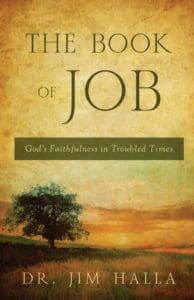With Memorial Day just around the corner, many of us are preparing for our summer vacations, time off from work, and time with our families.
As we do so, we take time to remember those who have gone before and have paid the ultimate price for our country. We celebrate their lives and their sacrifice. But how often do we do the same for those who have gone before us spiritually? How often do we take time to remember the stories or lives of those in the Bible who lived a life of faith, courage, or repentance? I believe these men and women are just as important to us from a spiritual standpoint. Some of these men include Job, the man who lost everything, Daniel, the man who risked everything, and David, the man after God’s own heart. These men represent three pillars: faith, courage, and repentance.

Job examines how deep our faith is when everything is stripped from us. Dr. Jim Halla in his new release, The Book of Job: God’s Faithfulness in Troubled Times seeks to show readers that even in our darkest hour, God is still sovereign over all.
This message is for all believers in all seasons of life, no matter their spiritual maturity.Dr. Halla begins by telling readers, “the book’s major focus is on the very essence of God and the believer’s relationship to Him in all types of God’s providence. Others tend to agree and view the book as cataloging the development of Job to become not only the most righteous among mortals but also the wisest. Therefore, the book has a relational emphasis highlighting who God is in relation to His people and His world.”

He goes on to explain that “Job was blameless and upright, caring for and interceding for his wife, and children, and helping others. However, he had problems – trouble – from the hand of God. Many speak of the suffering of Job. We need to be careful here. Too often the term suffering is undefined and is focused on the subjective – the person’s feelings which too often control his or her response. I prefer the generic term trouble. Labels have significance. Trouble must be understood as an expression of God’s providence: God’s control of His world, His way for His glory, and for the good of His people.”
Even what the enemy may use to harm us, God can turn it around and use it for our good and His glory. After all of the trials that Job faced, he never denied or turned away from God.
Because of this fact, everything that had been taken away was “restored and God brought back Job’s family, who apparently had alienated themselves from Job, the previously prosperous and caring patriarch. All of his family was forgiven, and they came and consoled, comforted, and rejoiced with him…. The faithfulness and trustworthiness of God are bedrock pillars of truth. Circumstances and experience (God’s providence), feelings, and human understanding divorced from biblical truth don’t negate these truths. Seeking to understand God and His ways may be a blessing or a curse. However, knowing God and His ways are privileges and blessings that every believer has.”
One thing we can learn from Job’s story is that our circumstances don’t change God’s goodness. God is still good, and “God extends His care – common grace – to even His enemies.
Fallen man has nothing within to “lure” or draw the Holy Spirit to him. On the contrary, God saves in spite of the person simply because God saves. This fact is captured by Jesus in John 6:44-65 and 12:32. The term for draw indicated the supernatural, inside-out influence of the Holy Spirit who regenerates the believer. It is not an ‘against-your-will’ influence but a heart-opening, eye-opening, ear-opening activity that moves the now-believer to desire and seek Life and Light – Jesus Christ. In Christ by the Holy Spirit, the believer is something – he is more than simply God’s image-bearer. He is God’s child, bought with a price, and indwelt with and by the Holy Spirit. In that sense, he is something because something was done to him and in him. As a result, Jesus gave Job, and Peter, and all believers, the command to minister in His name. Believers are to follow suit. The magnitude and awesomeness of God’s redemptive work can’t be overemphasized. You, too, will persevere and minister because God has you!”

We can find peace and rest in this, that God is control and is with us through every trial or trouble we may face. We can have the courage to face the unknown. This is evident in the life of Daniel. Terry Thompson takes readers on a journey through Daniel’s life and the courage he had despite his circumstances in his new book, Daniel: Prophet at the Kings Command. Daniel was taken captive by the Babylonians as a teenager and had to find a way to make the best of a difficult situation as a slave in the king’s court. Daniel and his friends had to try and honor God amidst a people who did not. Terry paints this picture by writing about Daniel’s life in a story-like format.
Throughout the Bible we can see many prophesies and see them fulfilled; however, “to begin exploring prophecies, particularly as they apply to our future, we need to dig into the book of Daniel.
Daniel lived in the sixth and seventh centuries B.C. He was born around 620 B.C. and lived to about 536 B.C. During those eighty-four or so years, the Hebrew people – the Jews – suffered one of the worst times in their history. Of course, the Jews have experienced physical and spiritual affliction from their origin in Abraham to the Egyptian slavery, to the exile in Daniel’s day…” and the list goes on.
The exile of Daniel’s day began with “the Babylonians invading the southern kingdom of Judah three times between 605 B.C. and 586 B.C. and took most of the country’s Jews into exile in Babylon.
Daniel, along with many other young men, were taken to Babylon in 605 B.C., almost twenty years before the ultimate defeat of Judah and the exile of the majority of the Judahites. [He] was a teenager when he was taken by force to Babylon. He was never the typical prophet of his day but became more of a seer, or a receiver of visions about the future. God gave most of the prophets’ supernatural knowledge of future events, but none received more than Daniel. That’s why he is a special source for understanding how events of the past and today relate to what is to come.”
“Daniel’s revelations pointed to the promised Messiah, and he trusted that promise. Other prophets before and after Daniel received messages about the coming of the Lord to Earth in physical form.
In fact, as I have mentioned repeatedly, the central theme of the whole Old Testament is the coming of the Messiah, Jesus Christ. If you miss forging a personal, committed relationship with Him, you miss God’s eternal plan for your life. The decision to be a loyal follower of Christ can’t come out of an infatuation with prophecy or from respect for a person. It has to come from a personal encounter between an individual and Jesus Christ.” Daniel had such an encounter. This is what allowed him to stand up courageously in and for his faith despite what was going on around him.
As we continue to read through the Bible, we find that David also had such an encounter and faith in God. David: The Godly Heart of a Sinful Man by author Terry Hyman examines David’s heart, identifying specific character qualities that influenced his response when confronted with his sin.
Humility, honesty, and confession were common, and it was evident that David cared more about getting right with God than defending his actions. The main point that we can find displayed in David’s life is that God does not expect us to be perfect, but instead, He wants a heart that is sensitive and responsive to the ministry of God’s spirit, a contrite heart.

By examining the story of David, we find the “ultimate ‘unexpected success’ story. An obscure shepherd boy from Bethlehem rose to become king of Israel.
Unqualified, undeserving, and unsuitable are all words that man would use to describe this unlikely candidate for royalty, yet God does not reason like man. He saw something in David that made him worthy of divine attention. David’s heart was different. David had a yearning to follow God, an eagerness to have God’s blessing on his life, and a willingness to sacrifice when necessary. ‘A man after His own heart’ is how the prophet Samuel described God’s view of David.”
What high praise to receive! However, even though God chose David, that does not mean that he was perfect or without sin. What set David apart from others was his response to his sin after he made a mistake.
He repented. But before he repented, we see that “for almost a year after his sin with Bathsheba, David lived with the disgusting shame of a man haunted by what he had done. He was suffering, and his guilt was overwhelming. It made no difference what he did or where he went – he could not escape the awareness of his dreadful deeds and their horrible consequences. Though God had chosen David to lead Israel specifically because of his godly heart, he was still only human. Acknowledging David’s fleshly nature doesn’t provide an excuse for his sin; it simply states the obvious truth. David was guilty of a series of despicable sins. Lust, adultery, deceit, murder, and hypocrisy mixed with pride and arrogance to produce unbearable guilt in his tender, responsive heart. His sins were committed secretly, willingly, and without human accountability.
So deep was David’s anguish of soul that his words pulsated with urgency as he sought God’s forgiveness. He no longer cared about concealing his sin. His resolve to justify his sin was gone.
He wanted only one thing – he longed to be reconciled to his God. At that point, everything changed. David’s guilt was gone. When David’s sin was concealed, he was miserable… when David’s sin was confessed, he regained his humility. When his sin was covered (as a result of his confession), his joy returned. He was forgiven and his guilt was gone!” David was willing to repent from his sin by confessing it to Nathan when Nathan confronted him about what he had done. He humbled himself before God.
Although David’s life could be viewed as a ‘rags to riches’ success story, what we should take away is that his life “is not about his accomplishments, his victories, or his faithfulness. Nor is it about his godliness.
It’s about David’s dependence on his God and God’s willingness to use him in spite of his human weaknesses. If we learn anything from David’s life, it is that David’s godly heart was not the result of his character. Instead, it was a consequence of David’s awareness of his ungodly character. The essential truth is that genuine godliness is possible only when we realize that it is impossible without God’s help. David clearly understood that principle. His life reflected that understanding, and his example is a challenge to every believer.”
No matter what circumstances you may be facing, God is still good.
Whether you are facing a difficult situation of loss like Job, experiencing uncertainty caused by outside forces like Daniel, or struggling with past mistakes like David, remember that there is peace, courage, and forgiveness to be found through Jesus. Our circumstances never change God’s goodness. He is constant. So, as we remember those who have gone before and sacrificed for our country, let us also remember those who have gone before in the faith and the example they set for us.
“So do not fear, for I am with you; do not be dismayed, for I am your God. I will strengthen you and help you; I will uphold you with my righteous right hand.” – Isaiah 41:10





